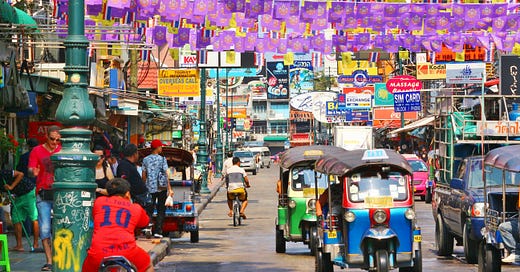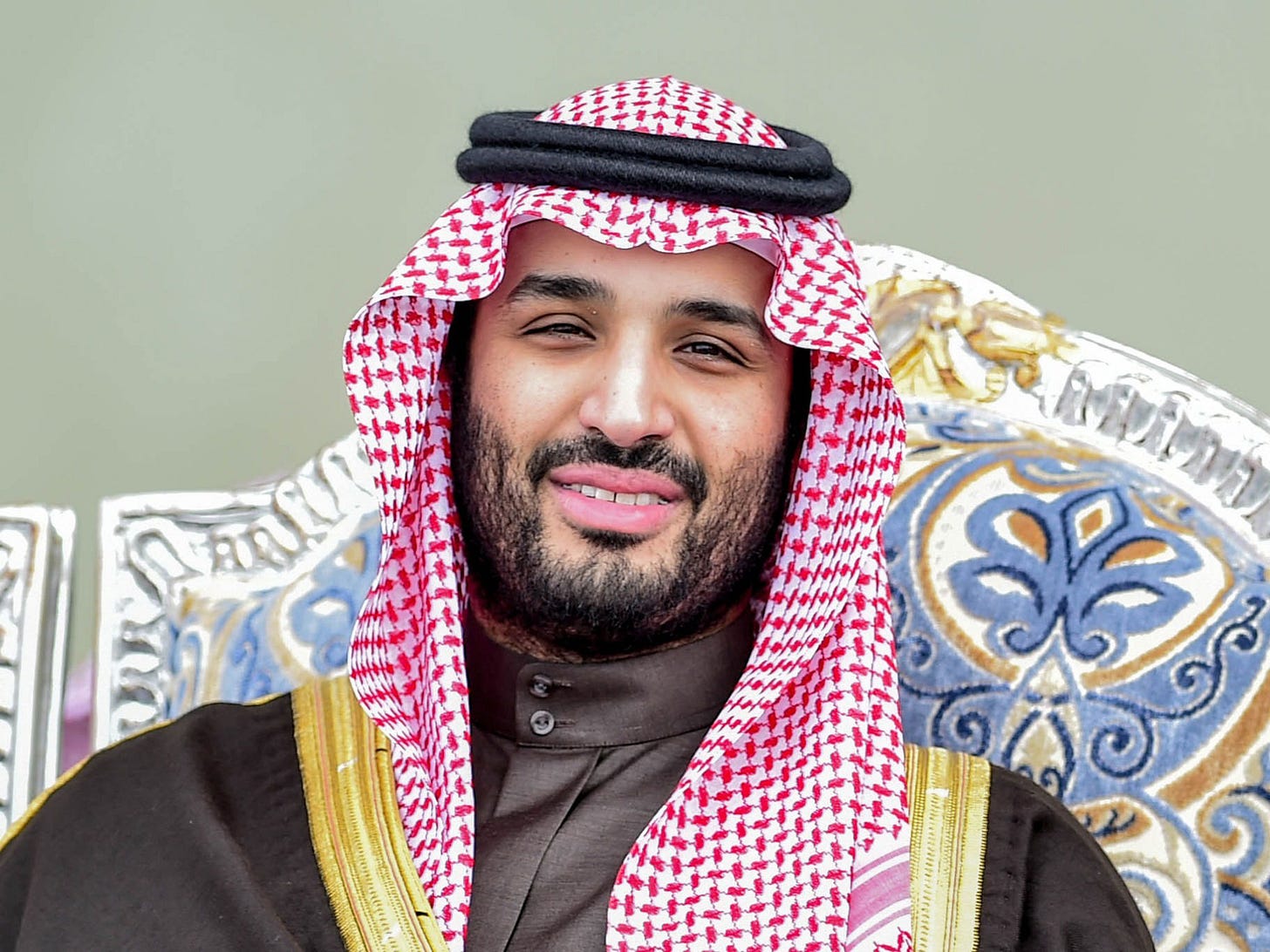Emerging Markets Daily - December 1
EM Faces 'Double Whammy' in '22, Turkey Intervenes in Lira Market, Saudi CP's Oman Visit, India Scuppers Intn'l Flight Opening, China's Digital Silk Road and Africa
The Top 5 Stories Shaping Emerging Markets from Global Media - December 1
Emerging Markets Face a ‘Double Whammy’ in 2022, Citi Says
Reuters
“Emerging markets will face a ‘double whammy’ in 2022, caught between limited growth and reduced risk appetite as a result of monetary tightening, David Lubin, head of emerging markets economics at Citi, said on Wednesday. ‘EM growth will suffer for a variety of reasons to do with weakening external demand growth, lower global trade growth, and the effects of further domestic monetary and fiscal tightening in many countries,’ Lubin wrote in a note to clients.”
“Looking beyond next year, developing nations were facing a 'broken growth model' caused by an irreversible slowdown in China, worsening demographics and rising economic nationalism, Lubin added, which might affect the flow of foreign direct investment. ‘The likely deterioration of the growth picture in EM leads to a difficult question: how will EM attract capital inflows?’”
“While this was unlikely to cause a crisis, these factors would sharpen the focus on domestic debt burdens in countries such as Brazil and South Africa, where weak growth and rising interest rates would push public debt to GDP ratios up to levels that might cause concern.”
“Overall, with major economies striving to make their supply-chains more resilient, developing nations that were close to large, major economies - such as Mexico, ASEAN nations or CEE countries - were in a better position than geographically remote ones for example in South America.” Reuters reports.
Turkey Intervenes (Again) in Currency Markets After Lira Tumbles
Financial Times
“Turkey has announced a return to a contentious policy of intervening in the currency markets in an attempt to steady the tumbling lira, despite a previous commitment not to do so and limited foreign exchange reserves. The central bank said on Wednesday that ‘unhealthy price formations’ had prompted the decision to sell hard currency such as US dollars in an effort to support the lira.”
“The move comes after the lira tumbled to a record low of TL13.87 against the US dollar earlier on Wednesday, a decline of 46 per cent compared with where it started in 2021.”
“The announcement sparked a strong rally, with the currency strengthening to about TL12.5 in London dealings — later trimming some of its gains to sit at TL13.2 to the dollar. Turkey has not announced a direct currency intervention since it sold $3.2bn at the beginning of 2014.”
“However, the country burned through tens of billions of dollars of its foreign currency reserves in 2019 and 2020 in an unofficial intervention that attempted to bolster the lira through a complex arrangement with state banks. That policy, spearheaded by Erdogan’s son-in-law Berat Albayrak during his time as finance minister, was highly contentious.”
“Opposition parties popularised the slogan: ‘Where is the $128bn?’ — a reference to one estimate of how much money was spent on the ultimately futile intervention. The scheme was halted in November 2020 when Erdogan brought Naci Agbal, a respected former bureaucrat, to the helm of the central bank and Albayrak resigned. Agbal was fired less than four months after his appointment.” The FT reports.
Saudi Crown Prince Plans Rare Visit to Nearby Oman
Bloomberg
“Saudi Arabia’s crown prince plans to make his first trip to neighboring Oman in the coming weeks, according to two people familiar with the matter, another sign of warming ties between the two Gulf states.”
“The visit by Prince Mohammed bin Salman, Saudi Arabia’s de facto ruler, will be his second foray abroad since the coronavirus pandemic began, after a brief trip to Egypt earlier this year.”
“The world’s largest crude exporter long had a cool relationship with Oman over its cordial ties with Iran, but it’s grown closer over the past year. That offers a potential economic boon for Oman, which is struggling to diversify away from oil. The death last year of Omani Sultan Qaboos bin Said, who ruled for five decades, opened an opportunity for change. Oman’s new sultan, Haitham bin Tariq, traveled to Saudi Arabia earlier this year on his first official foreign trip.” Bloomberg reports.
India Halts Scheduled Re-Opening of All International Flights Due to Omicrom
Nikkei Asia
“Days after India announced it would resume regular international passenger flights from mid-December, the government on Wednesday deferred that plan in view of the ‘evolving global scenario’ after the emergence of omicron.”
“The situation ‘is being watched closely in consultation with all stakeholders,’ said the Directorate General of Civil Aviation, the country's aviation regulator, in a statement.”
“The government imposed a ban on regular international flights to and from India in March last year to contain the pandemic. However, New Delhi subsequently established air travel bubble arrangements with over two dozen countries under which passenger flights have been operating.”
“On Nov. 26, the aviation authority announced that scheduled international passenger flights will resume from Dec. 15. Wednesday's move to postpone resumption of flights followed a Saturday meeting chaired by Prime Minister Narendra Modi to review the COVID-19 situation and vaccination efforts in the country.” Nikkei Asia reports.
Why China is Pushing ‘Digital Sovereignty’ in Africa
Rest of World
“This June, Senegal’s president, Macky Sall, proudly commissioned the construction of the Diamniadio National Datacenter, about 30 kilometers outside the capital city, Dakar. Sall said the West African country would move all government data and digital platforms from foreign servers abroad to the new center, in a move to boost Senegal’s digital sovereignity. The 506- square-meter facility, which cost 46 billion CFA francs ($18.2 million), was underwritten by a Chinese loan and built by Huawei, which is providing equipment and technical support.”
“For some observers, declaring Sengalese digital sovereignty, enabled and funded by China, can sound like a contradiction in terms. But it’s really just one facet of a wider issue captured by the deepening tech-telecoms relationship between China and nearly every African country over the past two decades and, crucially, what it portends for the economic future of the continent.”
“In 2018, FOCAC culminated in a total $60 billion promise by the Chinese to back numerous major infrastructure projects across Africa, with a mix of loans and grants underwritten by Chinese financial institutions, including the Export-Import Bank of China. It was all seen under the auspices of China’s ambitious Belt and Road Initiative (BRI), to build roads, bridges, and ports across the world, fully connecting China to the global economy via a modern-day Silk Road.”
“But it is the evolution of the “Digital Silk Road,” a term coined by Xi in a 2015 state white paper, that has quietly become a contentious topic for China-Africa watchers. The Digital Silk Road (DSR) includes everything from cross-border e-commerce, smart cities, and fintech apps through to big data, internet of things, smartphones, and undersea cables. These projects don’t grab headlines like shiny new Chinese-built airports and railways or spark panicked fears of China’s ‘debt trap diplomacy.’ But the unfettered influence of Chinese firms developing every step of the digital ecosystem in nearly all African countries has become a growing point of concern, particularly for China’s rivals in the United States.” Yinka Adegoke reports.
“It is better to fail in originality than to succeed in imitation." — Herman Melville





